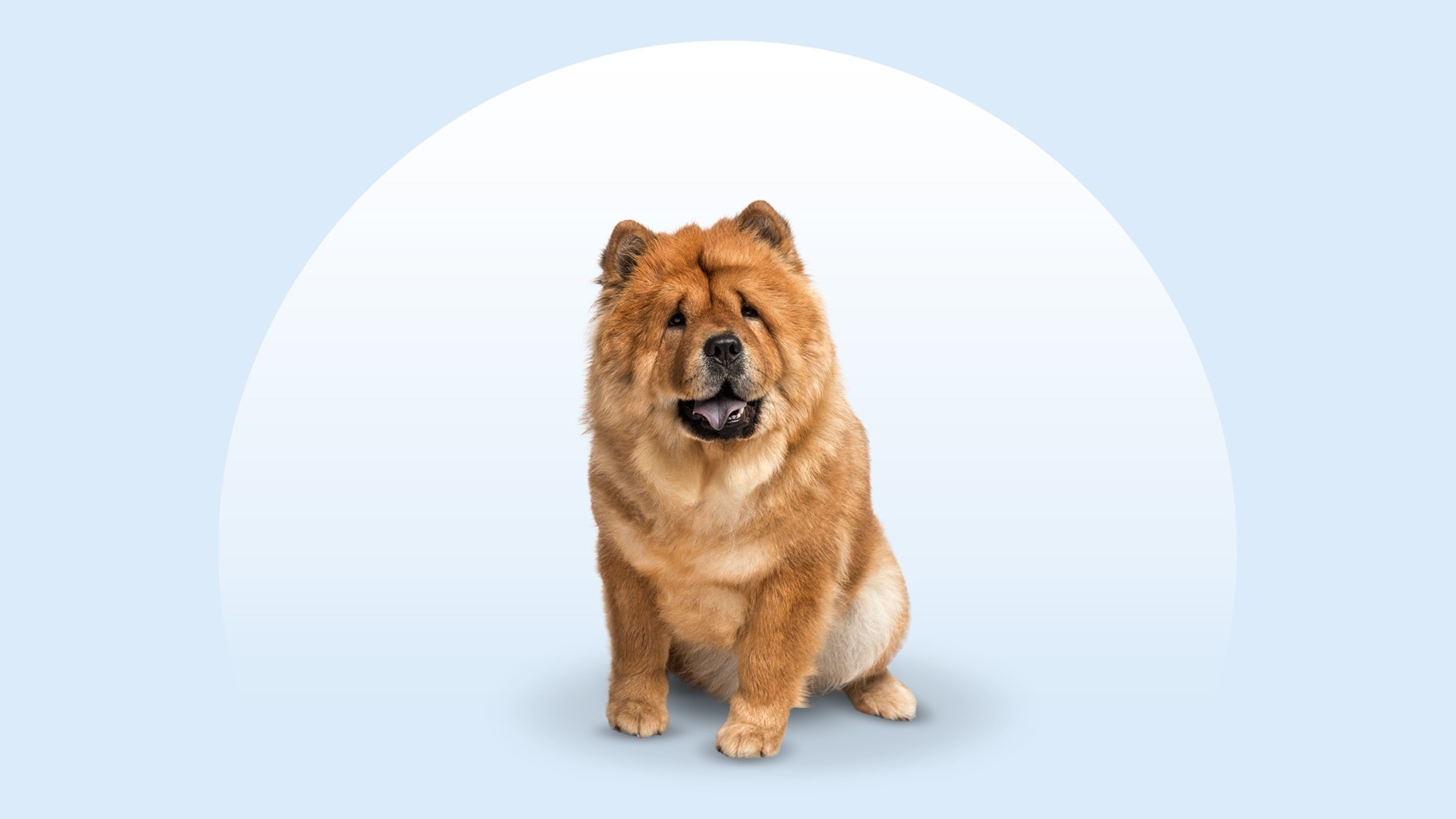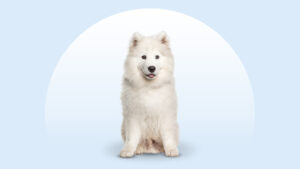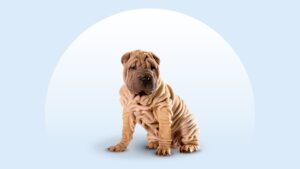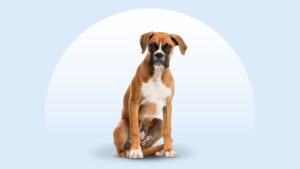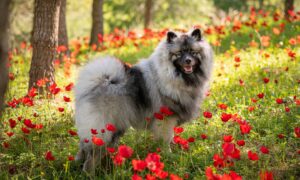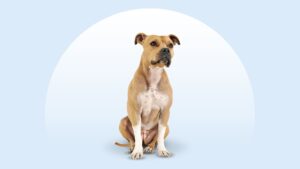Chow Chow
Updated December 15, 2025
Chow Chow
Updated December 15, 2025
Independent and loyal, Chow Chows are quiet dogs with an impressively lush coat. They thrive in calm homes with experienced, confident pet parents who understand that these dogs are not all about cuddling 24/7—can still give them the affection and love they need.
Bright, Loyal, Stoic
45–70 pounds
17–20 inches
8–12 years
Black, Blue, Cinnamon, Cream, Red
Independent and sometimes aloof, Chow Chows don’t accept just anyone into their inner circle, but that’s OK.
If you’re looking for a pup to live the A-list lifestyle with you, you’ve found them. The regal and fluffy Chow Chow looks the part of a celebrity, with their shaggy hair and eye-catching appearance.
Just like you, they enjoy mornings lounging in bed. They’ll also probably want the AC permanently on high—don’t even think about touching it—but with all that fur, you can hardly blame them.
Chow Chow Characteristics
Chow Chow Appearance
With a regal, lion-like appearance, these medium-sized dogs might be red, black, blue, cinnamon, or cream. You might also find them in white, lilac, or merle.
Their coat can be either a smooth or rough type, and their defining feature is their Chow Chow tongue that’s a lovely gray-blue color.

- Ears
The Chow Chow ears are small and triangular, slightly rounded at the point.
- Eyes
Their eyes are dark brown and almond-shaped.
- Nose
A Chow's nose is large, wide, and black with large nostrils.
- Coat Length
The Chow Chow has a double coat (meaning they have longer guard hairs on top of soft a undercoat) that’s either rough or smooth with a lion's ruff surrounding the head.
- Coat Color
Their coat might be red, black, blue, cinnamon, or cream. You might also find them in white, lilac, or merle.
- Tail
The Chow Chow tail is fluffy, feathery, and curled over their back.
Chow Chow Temperament
If you’re looking for a dog who’s a big snuggler, the Chow Chow might not be your pup. They aren’t overly affectionate, and while you’ll always be their one and only, they’re usually not people pleasers either.
But that’s actually OK because Chow Chows tend to be so well-behaved on their own: They’re clean, fairly quiet, and easy to housetrain. They’re also low maintenance when it comes to exercise, but take note: You’re going to need to spend extra on grooming.
Chow Chows take time to warm up to strangers. You’ll need to socialize your Chow Chow puppy early (or as early as possible if you adopt them as an adult) so they learn that new visitors are nothing to fear—and perhaps someone to be embraced.
When properly socialized, these pups can make great family dogs and can even get along with canine friends at home. Unfortunately, Chow Chows probably won’t tolerate a feline in their home thanks to their history as hunting and herding dogs.
They also will do best with older children who understand that they’re not into all that mushy love and cuddling stuff. But if you teach younger children how to interact with these unique dogs, it could work out.
How to Care for a Chow Chow
Facts are facts, and Chow Chows require lots of grooming. They aren’t high-energy dogs who need a lot of exercise (a daily walk or two is great), so you can use that extra bonding time for extra brushing.
While Chow dogs may not be overly showy with their affection, they’re super smart and quick learners when it comes to training.
Grooming
Training
Diet
Exercise
Environment
Chow Chow Health
The Chow Chow lifespan is 8–12 years, but there are a few health issues pet parents should be aware of.
- Allergies: Allergies may manifest as itchy skin around your pet’s feet, stomach, skin folds, or ears. Chow Chows may have seasonal allergies or food allergies, and your vet may recommend testing with a veterinary dermatologist.
- Bloat and gastric dilatation-volvulus (GDV): Chow Chows may be at risk of a life-threatening condition called bloat. It occurs when the stomach gets distended with air and/or food.
- A serious complication of bloat is GDV, when the stomach twists on itself, cutting off blood supply. Symptoms include abdominal distension, restlessness, and dry heaving. If you notice these signs, go to the vet immediately.
- Cancer: Stomach cancer is rare in most dogs, but unfortunately Chow Chows have 10–20 times the risk of other pups. They may also be prone to melanoma, or skin cancer.
- Elbow and hip dysplasia: With elbow dysplasia and hip dysplasia, the joint doesn’t fit properly. Treatment can involve joint supplements, physical therapy, pain meds, or, in severe cases, surgery.
- Endocrine conditions: Chow Chows can develop hypothyroidism and diabetes mellitus. Both are diagnosed through a blood test and can be managed with lifelong daily medication.
- Alopecia X: Alopecia X is hair loss that often affects dogs with thick undercoats. There are a variety of treatments, from melatonin to medications, depending on the severity.
- Eye issues: Chow Chows are prone to several eye problems, including:
- Luxating patella: Chow Chows can develop a luxating patella, where the kneecap slips out of place. A little bunny hop or skip while walking could be a symptom. It may be treated with supplements and meds, if mild, though surgery may be necessary.
Chow Chow History
One of the world’s most ancient breeds, the Chow Chow’s origins go as far back as 206 BCE, and maybe even earlier.
In their earliest years, these dogs were used for hunting, herding livestock, and even pulling sleds. Over time, they rose through the ranks to become faithful companions to Chinese nobility.
In the 1800s, Queen Victoria was said to have her own Chow Chow, and the American Kennel Club officially recognized the breed in 1903.
The average Chow Chow price tends to be between $1,800–$3,000. If you choose this route, pick a responsible breeder.
You can also consider Chow Chow adoption, as there are many waiting for their forever homes. Reach out to a local Chow rescue organization, keep an eye out for the breed at your local animal shelter, or search Chewy’s database of adoptable dogs in your area.
